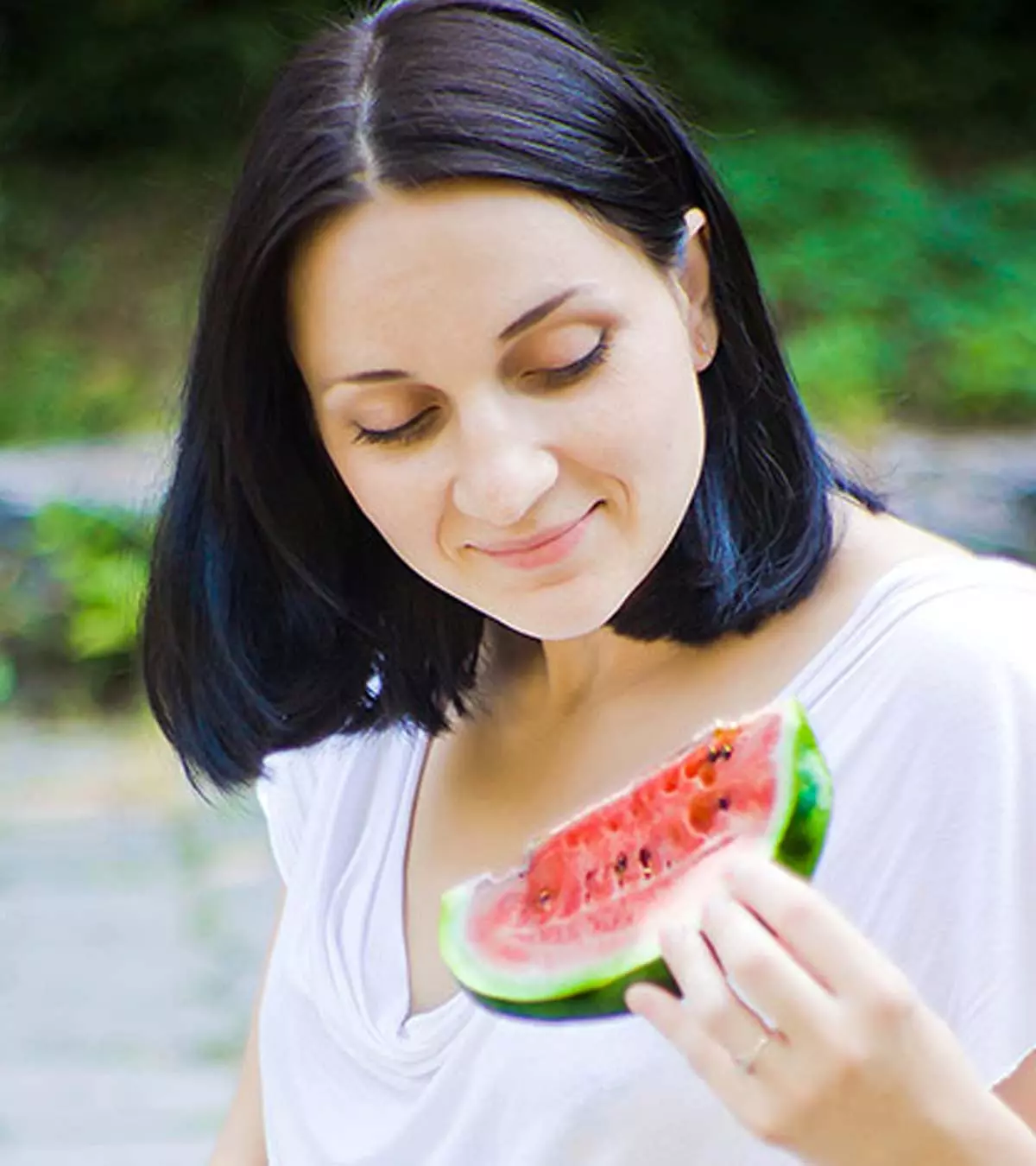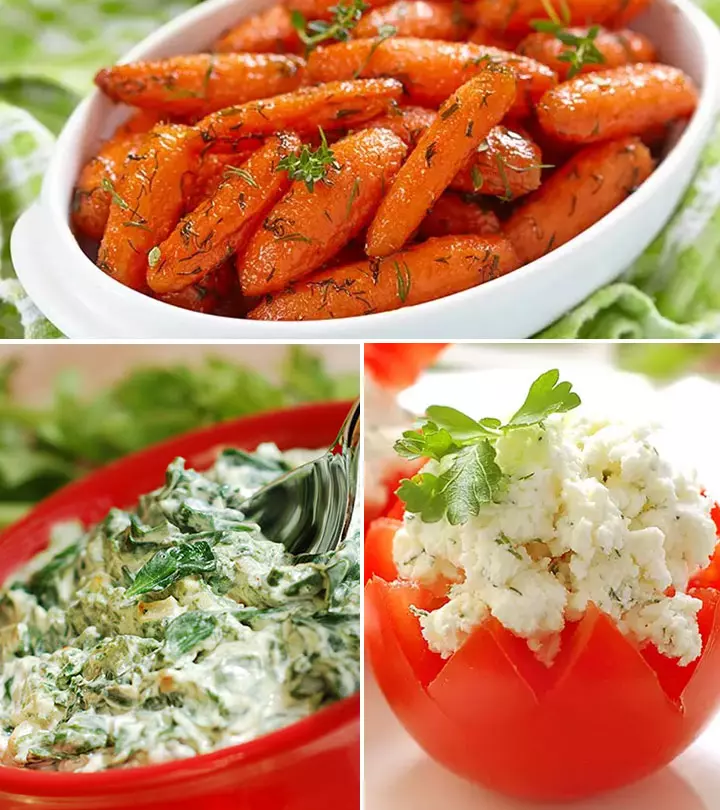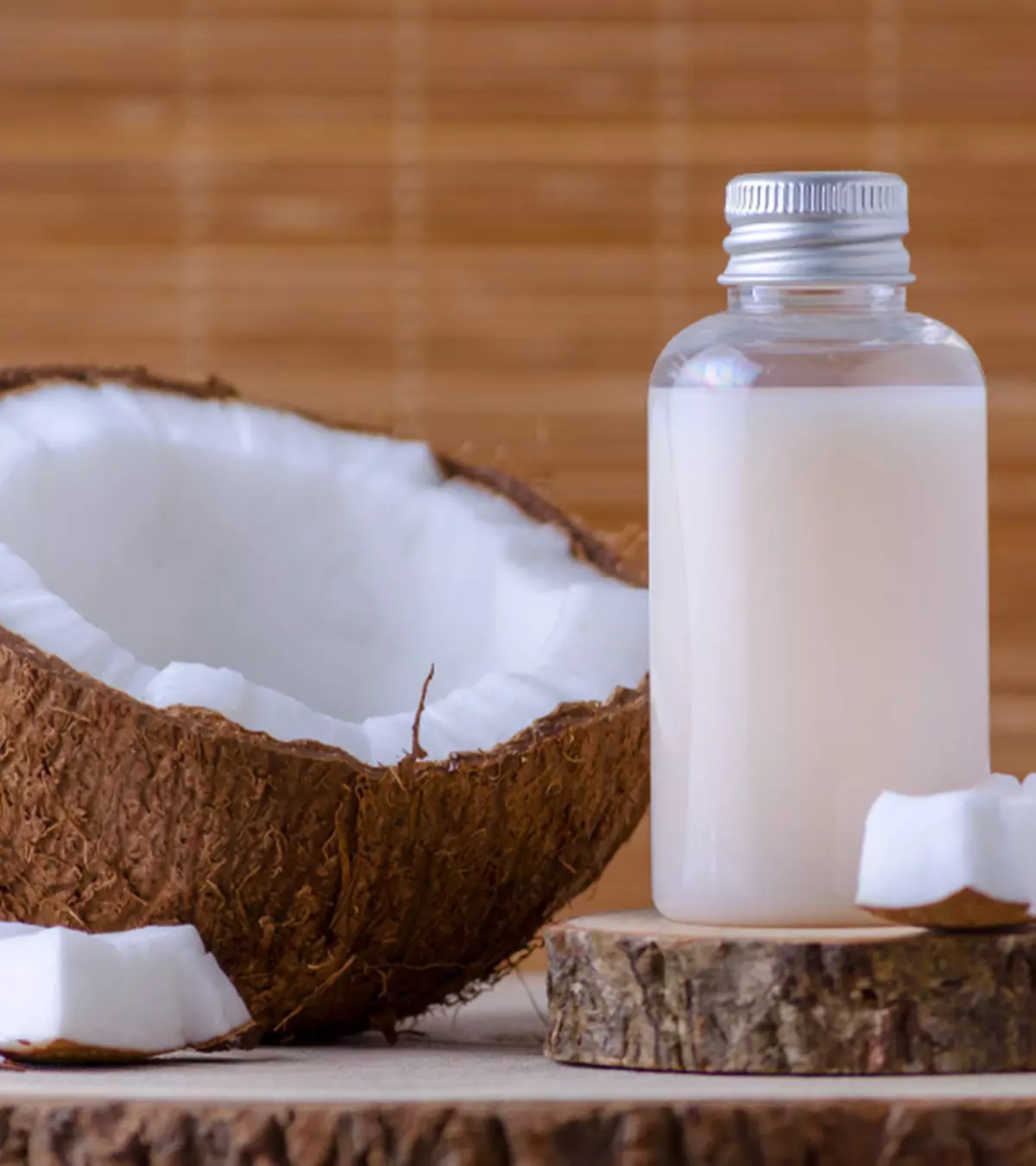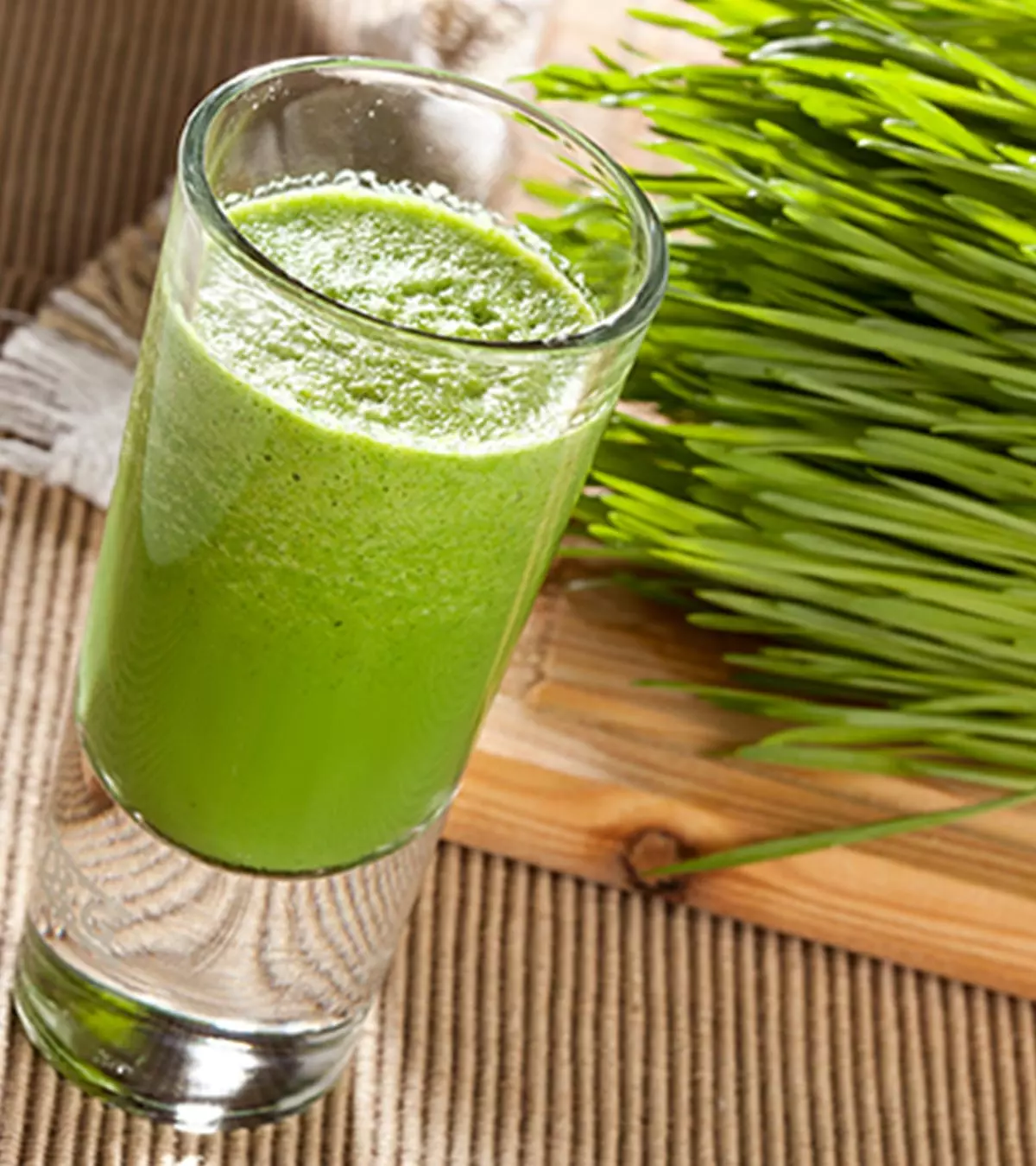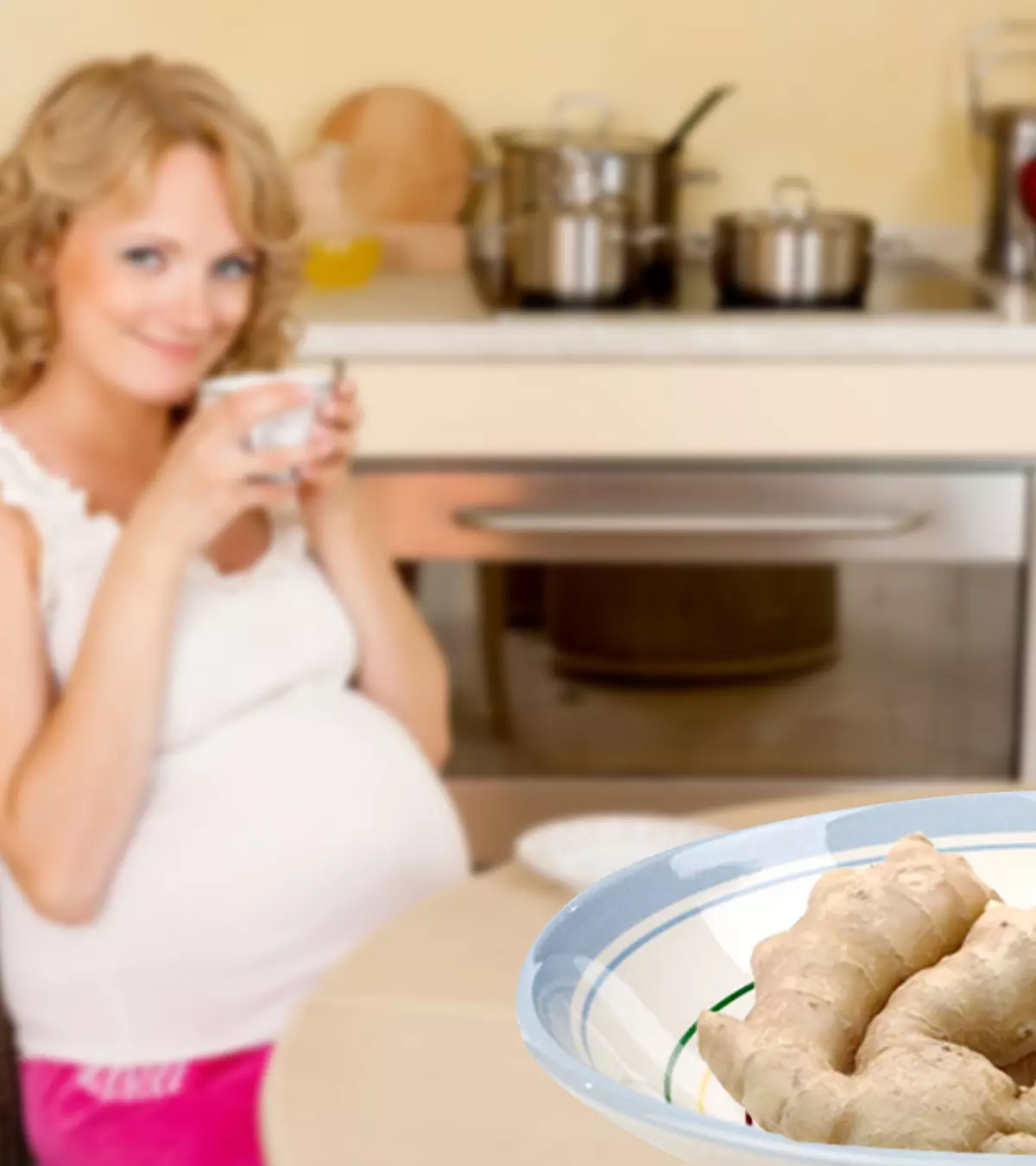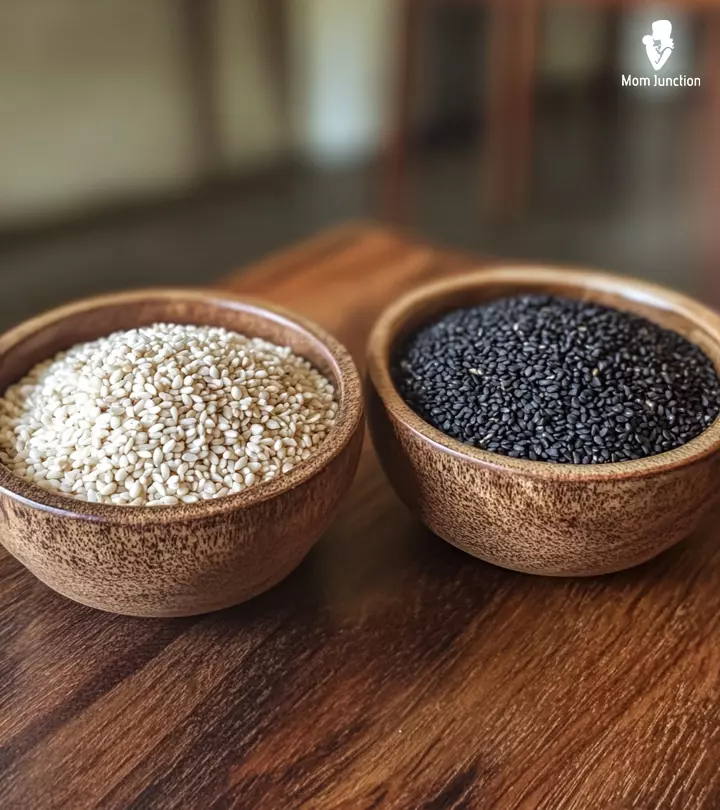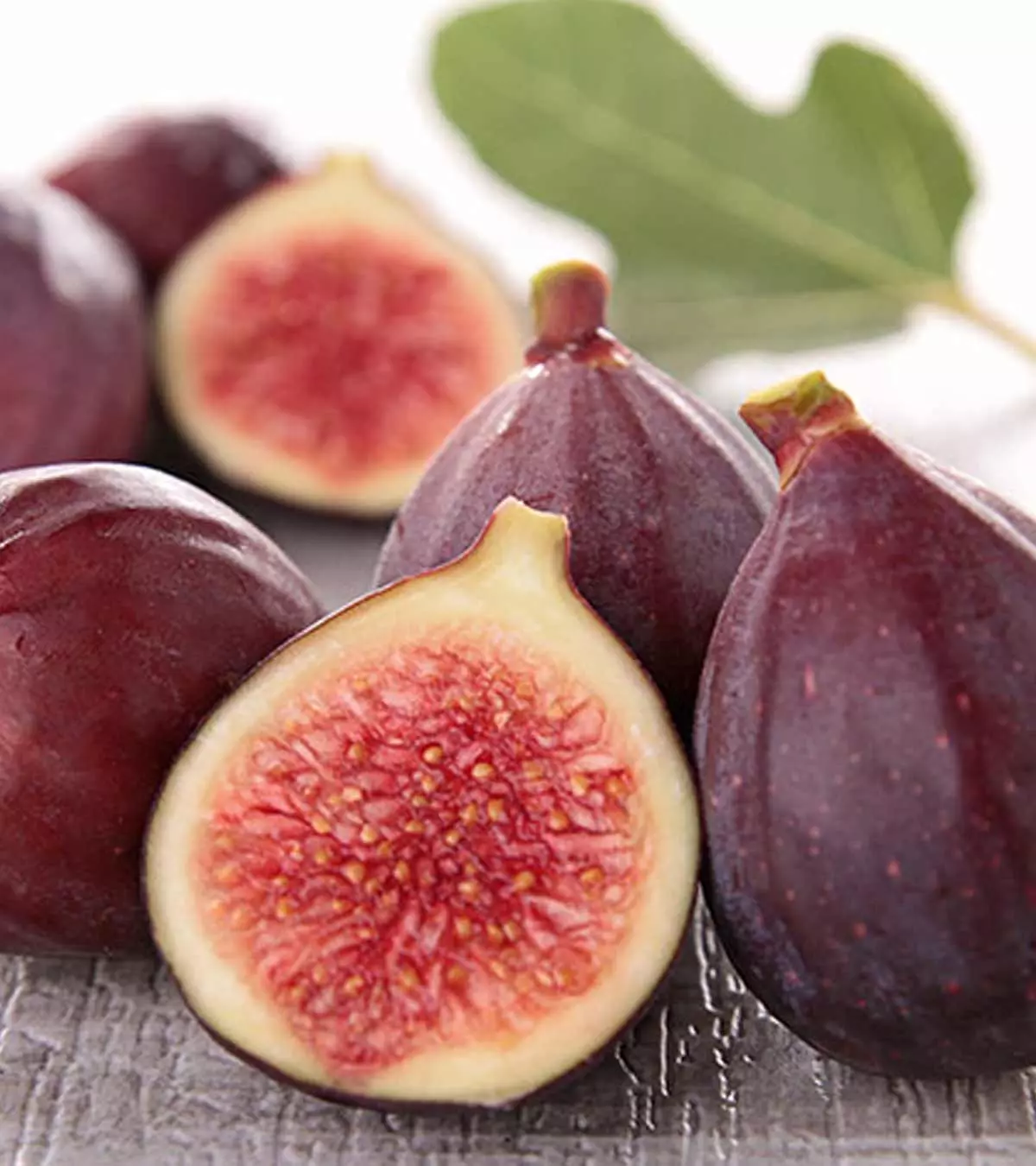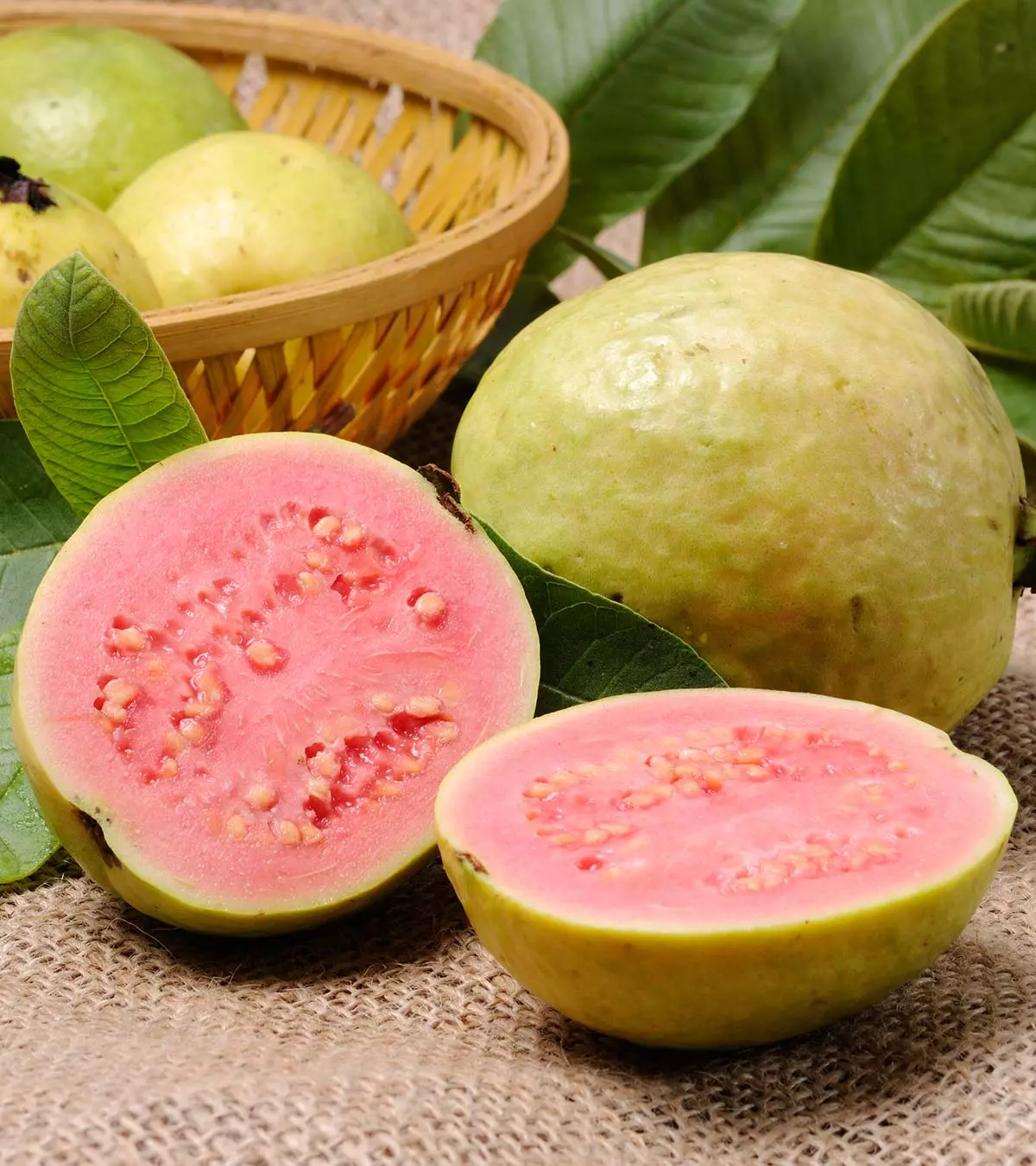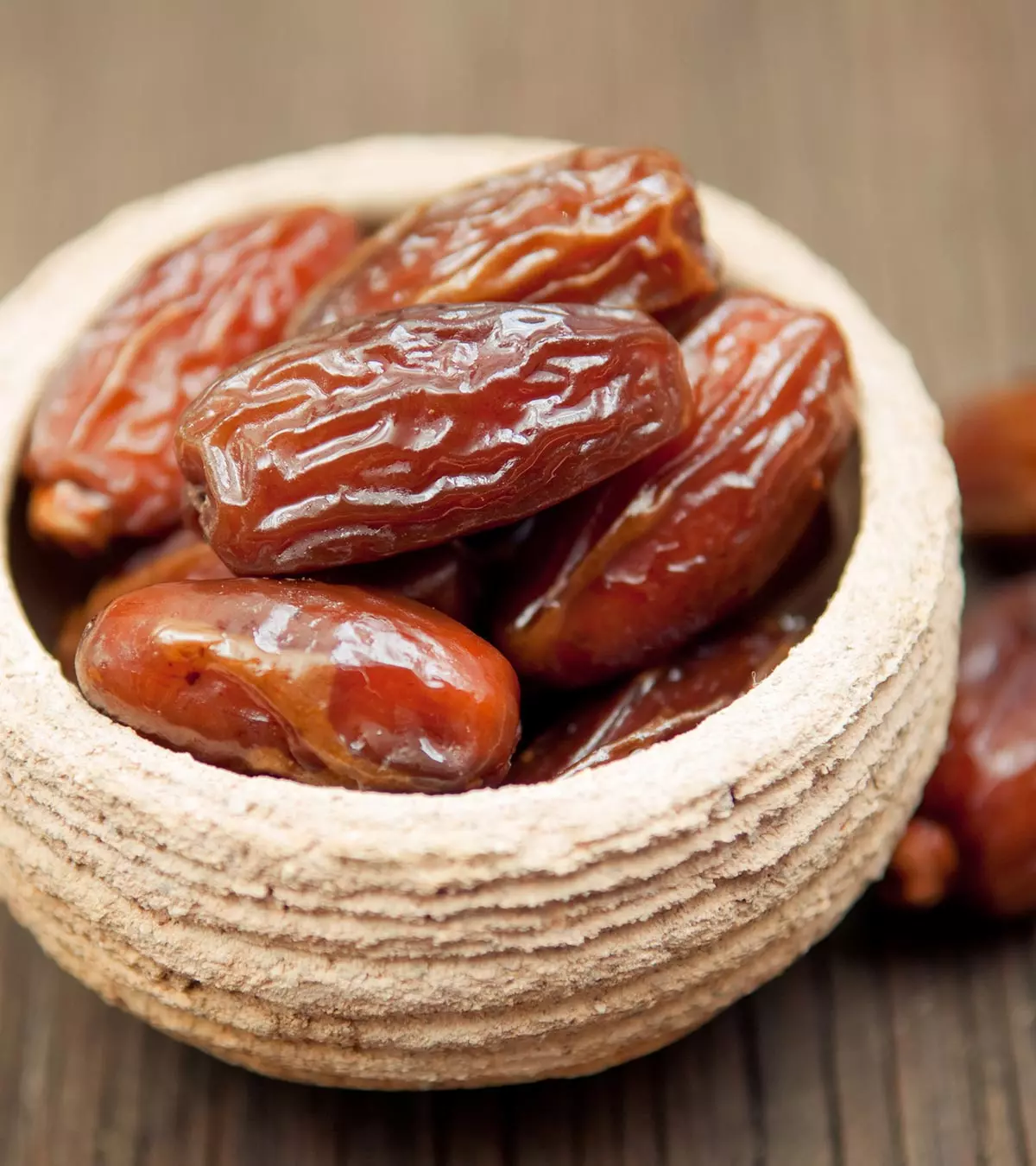
Dates are delicious and are a good source of vitamins and minerals. However, as a new parent, you may be doubtful about the safety of dates for babies. You will find up to 30 varieties of date, and these are primarily available in three forms—fresh, semi-dry, and dry. Ripe dates are packed with simple sugars such as dextrose and fructoseiTwo different types of sugar similar in structure to glucose. , instant energy boosters. Continue reading this post to know whether you can feed dates to your baby, the nutrients present, their health benefits, and ways to include dates in your baby’s diet.
Key Pointers
- Dates can be introduced to a baby’s diet when they start eating solids, in mashed or pureed form.
- Use the three-day rule to slowly introduce dates and check for sensitivities or allergies.
- Dates have high nutritional value and medicinal properties, providing many health benefits for babies.
- Serve fully ripe dates in moderation, steamed and cut into raisin-sized pieces, to aid digestion and prevent choking.
- Dates can be added to a baby’s diet in oatmeal, porridge, muffins, yogurt, or milk.
When Can You Introduce Dates To Your Baby?
You can introduce dates when your newborn turns six months or as soon as you start weaning the baby from breastfeeding or formula. Introduce dates in your baby’s diet slowly and preferably in mashed and pureed form. Always follow the wait-for-three-days rule and check if the baby is comfortable with the food. For personal guidance, you may talk to a pediatrician.
Do not choose dehydrated dates since they will be difficult for your baby to chew in the initial stages. Wait until they reach the teething milestone.
Nutritional Benefits Of Dates For Babies
Dates are recognized as ‘heart-healthy foods’ by the American Heart Association because of their low cholesterol and saturated fat content. They contain all the essential nutrients that are required for your little one’s healthy growth and development.
100 grams of dates (medjool type) offer the following nutritional value:
- Vitamin B9 (Folate) – 15µg
- Vitamin B3 (Niacin) – 1.6mg
- Vitamin B6 (Pyridoxine) – 0.24mg
- Vitamin B2 (Riboflavin) – 0.06mg
- Vitamin B1 (Thiamin) – 0.05mg
- Vitamin A – 7µg
- Vitamin K – 2.7µg
- Iron – 0.90mg
- Magnesium – 54mg
- Phosphorus – 62mg
- Zinc – 0.44mg
One whole date
One whole date offers the following nutritional value to your infant:
Calories – 66, fiber – 1.6gm, iron – 0.22mg, calcium – 15mg, potassium – 167mg and trace amounts of niacin, vitamin A, and folate.
Source: United States Department of Agriculture (1)
Sulfites are often used in dates and other dry fruits to prevent mold formation and increase shelf life. If your baby has been diagnosed with asthmaiA condition in which the airways swell and produce excess mucus, leading to difficulty in breathing. , confirm with your pediatrician about the safety of dates for your child.
 Quick fact
Quick factHealth Benefits Of Dates For Babies
Dates have high nutritional value and medicinal benefits, too (2)(3). Hence it has been a part of the main diet in many cultures across the world. Some of the benefits are:
1. Fight intestinal disorders
Dates are useful remedies for intestinal problems.
They fight with the parasitic organisms and help establish friendly bacterial colonies in the intestine.
2. Protect the liver
The liver is prone to bacterial and viral infections in children. Studies reveal that dates have liver-protecting properties and, therefore, including them in your baby’s diet will help.
3. Help with teeth development
You can give full ripe dates to your teething babies for stronger dental development. By chewing dates, the teeth and gums receive adequate exercise and can develop stronger and quicker.
4. Provide extra nourishment during fevers

Image: IStock
InfuseiSoak a substance in water to get the flavor in the liquid. dates in milk and give it to your baby when they are suffering from a fever, cough, and smallpox. This infusion, rich in nutrients, helps in speedy recovery.
5. Help treat dysentery
Babies might have dysenteryiAn intestinal infection that causes watery stools (diarrhea) containing mucus or blood. — a bacterial infection in the large intestine. Dates help in controlling this condition.
6. Relieve constipation
Dates help relieve constipation, which is a common problem in babies. The dietary fiber content helps promote digestion and add bulk to the stools, thus ensuring smooth bowel movements.
7. Improve vision
The high vitamin A content in ripe dates enhances your little one’s vision, thus providing healthy eyesight.
8. Boost the immune system
The antioxidants and free radicals present in dates help fight infections, upgrading your baby’s immune system on an everyday basis.
9. Improve hemoglobin levels
The rich iron content in dates increases the hemoglobin count in your baby’s red blood cells, ensuring healthy growth and no anemia.
10. Improve weight

Image: Shutterstock
Dates help in weight gain. You may give dates to your infant to reach the weight milestones for their age.
11. Boost brain health
Dates contribute to enhanced brain health due to their rich antioxidant content. Antioxidants in dates help prevent inflammation in the entire body, including in the brain. Studies suggest that reducing inflammation may lower the risk of neurodegenerative diseases such as Alzheimer’s, Parkinson’s, and Amyotrophic lateral sclerosis (ALS).
How To Add Dates To Your Baby’s Diet?
You may try several creative ways to add dates to your baby’s food. Here are a few ideas to start with:
- Sprinkle a few chopped dates over the oatmeal (if the baby can chew and swallow properly)
- Bake them into muffins
- Plain yogurt mixed with dates puree
- Add dates to milk for a yummy milkshake
You can use bananas and dates to make baby-friendly muffins. Habiba Anwar, a mother of a ten-month-old, shares an easy-to-prepare muffin recipe she often makes for her daughter. She writes, “Warm up your oven to 180°C. Sift the flour, baking powder, and baking soda in a bowl. In a separate bowl, smoothly blend the mashed banana and butter. Include the egg, and mix in the flour mixture. Lastly, add the milk and dates. Use a spoon to fill a muffin tin lined with paper, then bake for about 20 minutes. Allow the muffins to cool before serving them to your baby (i).”
Dates are sticky and might stick to your little one’s teeth. It leads to bacteria that produce acid and cause tooth decay. Make sure you clean your baby’s teeth or give them water to drink after consuming dates.
Healthy Date Recipes For Babies
You can prepare baby food using dates. Babies can have these recipes after the age of six months when they are ready for other solid foods too. Here are some fantastic recipes to add dates.
1. Fresh dates puree
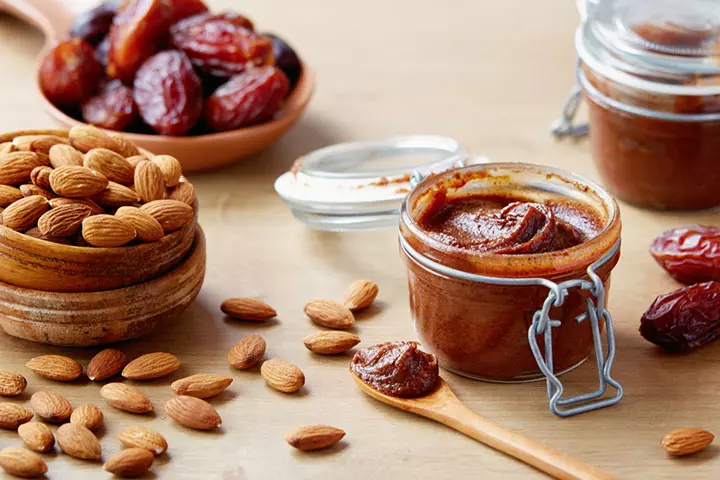
Image: Shutterstock
Fresh dates have a lot of fiber and make excellent solid food for your baby.
You will need:
- 1 cup pittediSomething (Fruits, etc.) that is seedless. fresh dates
- 1-2 cups of water
How to:
- Soak the dates in water for a couple of hours; overnight preferably, to soften the skin of the dates.
- Do not discard the water. Transfer the dates along with the water into a blender.
- Blend the dates for 2-3 minutes or till you do not see any solid fiber in the blend. Fresh dates have a lot of fiber, so use the maximum blending setting of your blender.
- Once blended, use a spoon to check for any hard lumps. If any, blend for some more time, and if there are none, then the puree is ready to serve.
2. Dried dates and banana puree
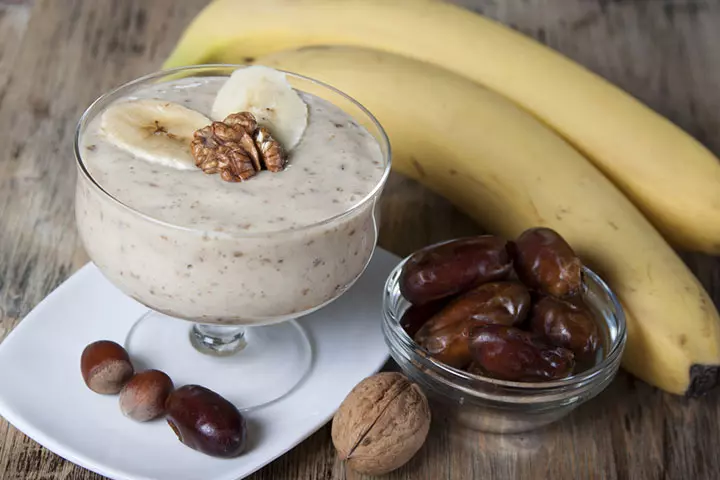
Image: Shutterstock
Fruit purees for babies can be an excellent way to satiate their preference for sweet-tasting foods. This dish can be a great dessert for a young baby who cannot yet have added sugar.
You will need:
- 1/3 cup of chopped dried dates with no added sugar or preservatives
- 1 chopped banana
- 2-3 cups of water
How to:
- Soak the dried dates in water for a couple of hours or overnight.
- Transfer the dates along with the water to the blender. Add the chopped banana to it.
- Blend till the puree reaches a thin consistency. Add more water if needed. Once done, the puree is ready to be served.
3. Dates and rice porridge
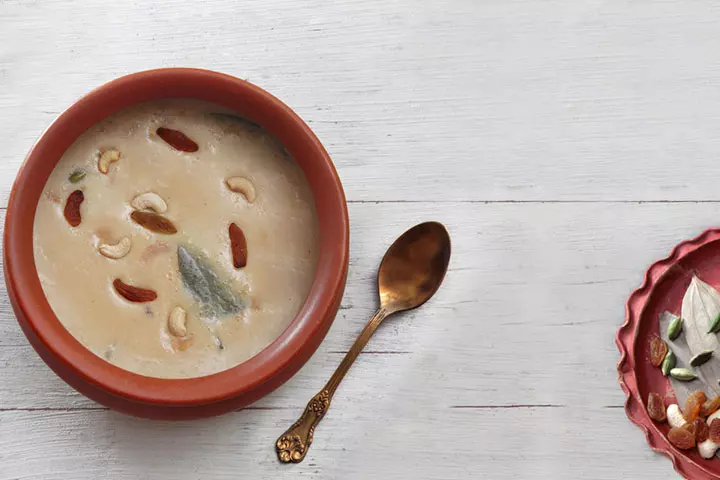
Image: Shutterstock
It can make a good breakfast item for a baby and even toddlers.
You will need:
- 2 cups boiled & cooked rice
- 1/2 cup finely-chopped dried dates
- 1/2 cup finely-chopped fresh dates
- 3 cups of water
How to:
- Soak the dates for an hour. Put the dates and water into a blender.
- Add cooked rice to the blender and pour in the water. Blend them together.
- If your baby loves thicker consistency, then add less water; otherwise, add extra water to make the porridge thinner.
 Quick tip
Quick tipPrecautions To Take When Giving Dates To Babies
, a pediatric and pregnancy dietitian from Liverpool, England, says, “If giving dry dates, I would advise choosing the ones that are naturally dried without any sugar or syrup. Moreover, since dates may be a choking hazard, they should be chopped small before giving to the baby. I advise giving dates only to babies over 18 months of age and keeping the portion size to one or two.”
Babies have a fragile digestive system. Here are some simple precautions you may follow:
- Always give dates cut into the size of a raisin to avoid any choking risk or in mashed or puree form for safe consumption and better digestion.
- If your baby has started walking, make sure they do not run while chewing dates, to avoid choking.
- Give fully ripe dates with sweet pulp. Unripe dates contain tannins, which may cause stomach-related allergies.
- Steamed dates are a better choice than raw or boiled ones.
- Raw dates can be given after your baby grows older and starts eating foods from various food groups.
Dates are nutritious, but it’s important to look out for possible signs of allergies or digestive issues. Always check with a pediatrician before offering new foods to your baby, especially if they have a history of allergies.
 Point to consider
Point to considerFrequently Asked Questions
1. How many dates can babies safely eat per day?
Though there is no official recommendation for the number of dates suitable for babies, they may be given one date to start with, increasing it to two to three dates at a time.
2. Are there any specific types of dates that are better for babies than others?
There are no specific types of dates especially suited for the consumption of babies. However, avoiding the ones containing added sugars or sugar syrups is advisable.
3. What are the different types of dates and their benefits?
Medjool dates are larger and sweeter, Deglet Noor dates are considered better for cooking, and Ajwa dates are rich in dietary fibers, lipids, minerals, flavonoids, and proteins. Honey dates act as natural sweeteners, and Sayer dates have high sugar content (4). Other varieties include Sawafi, Zahidi, Khudri, Sukkary, Halawi, Dayri, Rabbi, Barhi, Mazafati, and Piarom dates.
4. How can I make date syrup?
Creating a nourishing date syrup for your baby is quite simple. Begin by chopping 500 grams of dates into small pieces, ensuring you remove the pits. Place the chopped dates into a pan and cover them with water. Heat the mixture until it thickens into a syrup-like texture. Once done, switch off the stove and let it cool down. Pour the syrup into a container with a secure lid. This homemade date syrup is an all-natural sweetener for your little one’s meals.
Dates are a healthy addition to your baby’s diet. Their high-fiber content and good nutrient composition help in a baby’s proper growth and development. But if your baby is still getting acquainted with solid foods, introduce dates into their diet through purees and porridges. Also, wait for three days after the first consumption to see if your baby is sensitive to dates. Introduce dates for babies and only progress based on your baby’s comfort level. If you have any queries, consult your pediatrician and clarify them.
Infographic: Healthy Date Recipes For Babies
It is evident from the above information that dates are highly nutritious fruits containing vitamins and minerals. Thus these can make a healthy addition to your baby’s diet. But because babies can be fussy eaters, we provided a few easy and tasty recipes to help them relish the fruit and reap its benefits.

Illustration: Momjunction Design Team
Illustration: Dates For Babies: When To Introduce And Recipes To Try

Image: Stable Diffusion/MomJunction Design Team
Experience the delightful natural sweetness of date powder in your baby’s porridges and desserts. This nourishing and iron-rich baby food is an ideal choice for promoting your little one’s well-being.
Personal Experience: Source
MomJunction articles include first-hand experiences to provide you with better insights through real-life narratives. Here are the sources of personal accounts referenced in this article.
i. Banana and date mini muffins;https://eatwritebe.wordpress.com/2015/05/15/banana-and-date-mini-muffins/
References
1. Dates, Medjool;USDA
2. Praveen K Vayalil; Date Fruits ( Phoenix dactylifera Linn): An Emerging Medicinal Food; Critical Reviews in Food Science and Nutrition (2012)
3. The Sweet Health Benefits of Dates;Cleveland Clinic
4. Sumaira Khalid; A review on chemistry and pharmacology of Ajwa date fruit and pit; Trends in Food Science and Technology
5. A A A Kwaasi et al; Cross-reactivities between date palm (Phoenix dactylifera L.) polypeptides and foods implicated in the oral allergy syndrome; NCBI
Community Experiences
Join the conversation and become a part of our nurturing community! Share your stories, experiences, and insights to connect with fellow parents.
Read full bio of Huda Shaikh
- Hannah Whittaker is an expert pregnancy and pediatric dietitian with nearly 20 years of experience, the last 7 years as a registered dietitian. She manages her private practice Bump2baby Nutrition in the UK, having done her graduation in community nutrition and dietetics from Liverpool John Moores University & University of Chester respectively.
 Hannah Whittaker is an expert pregnancy and pediatric dietitian with nearly 20 years of experience, the last 7 years as a registered dietitian. She manages her private practice Bump2baby Nutrition in the UK, having done her graduation in community nutrition and dietetics from Liverpool John Moores University & University of Chester respectively.
Hannah Whittaker is an expert pregnancy and pediatric dietitian with nearly 20 years of experience, the last 7 years as a registered dietitian. She manages her private practice Bump2baby Nutrition in the UK, having done her graduation in community nutrition and dietetics from Liverpool John Moores University & University of Chester respectively.
Read full bio of Swati Patwal
Read full bio of Rohit Garoo
Read full bio of Vidya Tadapatri









